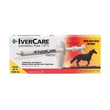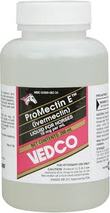Pronunciation
i-ver-MEK-tin - Pronunciation guide
Brand Names
- Ivercide Equine Paste
- Ivermax Equine Oral Liquid
- Ivermax Equine Paste Dewormer
- Ivermectin Paste 1.87%
- Parid EQ Liquid for Horses
Description
 Ivermectin is a drug mixture of two structurally semisynthetic lactones that is used in veterinary medicine as an anthelmintic, boticide, acaricide, and insecticide. Ivermectin has a broad spectrum of activity against intestinal and insect parasites, and kills migrating larvae. Most veterinarians recommend its use in all horse deworming programs because of its results.
Ivermectin is a drug mixture of two structurally semisynthetic lactones that is used in veterinary medicine as an anthelmintic, boticide, acaricide, and insecticide. Ivermectin has a broad spectrum of activity against intestinal and insect parasites, and kills migrating larvae. Most veterinarians recommend its use in all horse deworming programs because of its results.
Injectible form is frequently used extra-label and requires veterinary prescription.
Usage
Under a veterinarian's assistance in the diagnosis, treatment, and control of parasites, ivermectin provides effective broad spectrum control of the following: bots, habronema, ascarids, strongyles, thread worms, pinworms, tape worms, lung worms, and is also effective against the filaria of Onchocerca, larvae of habronema, and arterial larvae stages of strongyles.
Dosage and Administration
| Ivermectin | ||||
|---|---|---|---|---|
| Method | Dosage (click row for calculator) |
Concentration | Period | Duration |
| Oral paste1 | 0.2 mg/kg | 136.5 mg/syringe | Consult veterinarian4 | NA |
| Oral liquid2 | 0.2 mg/kg | 10 mg/ml | Consult veterinarian4 | NA |
| Intramuscular injection3 | 0.2 mg/kg | 10 mg/ml | Consult veterinarian4 | NA |
Notes:
|
||||
Side Effects
Swelling and itching reactions after treatment with ivermectin have occurred in horses with heavy infections of neck threadworm microfilariae. The reaction is most likely the result of microfilariae dying in large numbers. Symptomatic treatment may be advisable. Consult a veterinarian, should any reactions occur.
Precautions
Ivermectin is formulated specifically for use in horses. Do not use in treatment of any other animal species, as severe adverse reactions may occur. Wash hands after use. Avoid contact with eyes. Do not contaminate ground or surface water. Dispose of containers and syringes in approved landfill or by incineration.
Interactions
No interactions are noted in literature.
Overdose
Ivermectin is toxic. Immediately consult with a veterinarian if overdosing occurs.
Images
 IverCare Injectable Paste
IverCare Injectable Paste
 ProMectin Ivermectin Oral Tablets
ProMectin Ivermectin Oral Tablets
Literature
